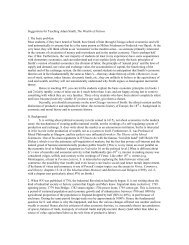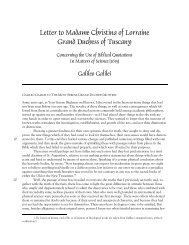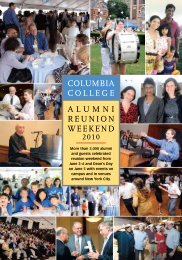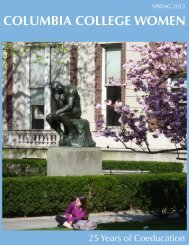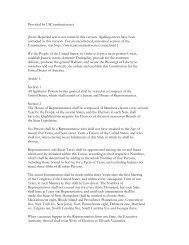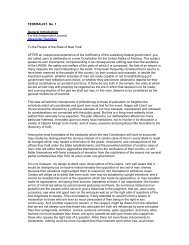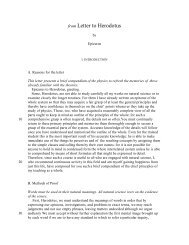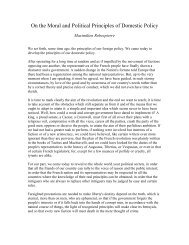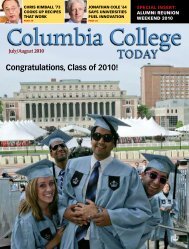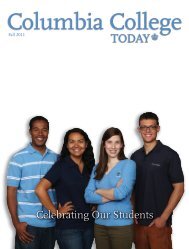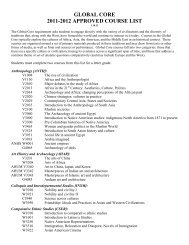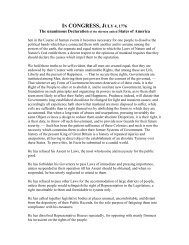Download this issue as a PDF - Columbia College - Columbia ...
Download this issue as a PDF - Columbia College - Columbia ...
Download this issue as a PDF - Columbia College - Columbia ...
Create successful ePaper yourself
Turn your PDF publications into a flip-book with our unique Google optimized e-Paper software.
COLUMBIA COLLEGE TODAY<br />
COLUMBIA COLLEGE TODAY<br />
BOOKSHELF<br />
Bookshelf<br />
Phillip Lopate ’64 Takes Stock<br />
B y Jessamine Chan ’12 A r t s<br />
The Voice is All: The Lonely Victory<br />
of Jack Kerouac [’44] by Joyce<br />
Johnson. Johnson explores Kerouac’s<br />
dual identity <strong>as</strong> a French-Canadian<br />
and an American, and <strong>as</strong>sesses<br />
how being caught between the two<br />
cultures and languages affected his<br />
writing (Viking, $32.95).<br />
The Mating Flower by Dr. Enoch<br />
Callaway ’45. Callaway’s novel<br />
revolves around a mystical flower<br />
and the research to harness its<br />
love potion-like powers, leading<br />
to tales of love and crime-solving<br />
(self-published, $10).<br />
Betty Sue’s Homecoming and Her<br />
Rocky Path to Respectability by<br />
Durham Caldwell ’48. In <strong>this</strong> novel,<br />
a young woman returns home 27<br />
years after disappearing to find<br />
she must adapt to small town life<br />
and overcome the demons from<br />
her years in NYC (CreateSpace<br />
Independent Publishing Platform,<br />
$14.95).<br />
V<strong>as</strong>tation by Lewis E. Birdseye ’60.<br />
In <strong>this</strong> novel, a father and son take<br />
a journey on the trails of Oregon’s<br />
Willamette National Forest, gaining<br />
an understanding of life and its<br />
complexities along the way (Xlibris<br />
Corp., $19.99).<br />
The Mountain of Long Eyes: An<br />
Anthology of Science Fiction and<br />
Fant<strong>as</strong>y by Thom<strong>as</strong> Wm. Hamilton<br />
’60. This collection includes more<br />
than 25 stories on subjects such<br />
<strong>as</strong> time travel, alternate history,<br />
horror, politics and space opera<br />
(Strategic Book Publishing and<br />
Rights, $13.95).<br />
Qualities of Duration: The Architecture<br />
of Phillip Smith [’61] and<br />
Dougl<strong>as</strong> Thompson by Al<strong>as</strong>tair Gordon.<br />
This book showc<strong>as</strong>es the work<br />
of architects Smith and Thompson,<br />
whose designs embody a sense of<br />
spatial quietude and inspiration<br />
(Damiani/Gordon de Vries Studio,<br />
$50).<br />
John Dante’s Inferno, A Playboy’s<br />
Life by Anthony Valerio ’62. The<br />
author recounts tales of hedonism,<br />
excess and friendship from the 26<br />
years his late friend and Playmate<br />
recruiter — under the pseudonym<br />
John Dante — lived in the Playboy<br />
Mansion (Daisy H Productions,<br />
$9.43).<br />
The Man Who Got Lost: North<br />
Quabbin Stories by Allen Young<br />
’62. In <strong>this</strong> collection of articles and<br />
columns written between 1978–<br />
2012, Young describes life in the<br />
area north of Quabbin Reservoir in<br />
M<strong>as</strong>sachusetts (Haleys, $15).<br />
To Show and To Tell: The Craft<br />
of Literary Nonfiction by Phillip<br />
Lopate ’64. The School of the Arts<br />
professor <strong>as</strong>sembles a comprehensive<br />
guide to writing literary nonfiction<br />
(see <strong>this</strong> <strong>issue</strong>’s featured<br />
book for the story of Lopate’s<br />
other new work) (Free Press, $16).<br />
The Death and Life of Main<br />
Street: Small Towns in American<br />
Memory, Space, and Community<br />
by Miles Orvell ’64. Orvell studies<br />
the nostalgic construct of Main<br />
Street in American culture, including<br />
its allure, ideology and function<br />
<strong>as</strong> a space (The University of<br />
North Carolina Press, $39.95).<br />
The Ellington Century by David<br />
Schiff ’67. Schiff examines the work<br />
of American composer Duke Ellington<br />
and other composers of his time,<br />
their relationship to music’s modernization<br />
and their effects on their successors<br />
and music today (University<br />
of California Press, $34.95).<br />
Moneywood: Hollywood in Its<br />
L<strong>as</strong>t Age of Excess by William Stadiem<br />
’69. Digging into the culture<br />
of 1980s Hollywood, Stadiem highlights<br />
a crooked c<strong>as</strong>t of the era’s<br />
powerful executives and producers<br />
who cheated, embezzled and<br />
womanized their way to the top<br />
(St. Martin’s Press, $26.99).<br />
The Magician’s Twin: C.S. Lewis<br />
on Science, Scientism, and Society<br />
edited by John G. West, featuring<br />
essays by M.D. Aeschliman ’70 and<br />
others. Aeschliman discusses Lewis<br />
and scientism in two essays (Discovery<br />
Institute Press, $24.95).<br />
The Life & Times of Fred Wesley<br />
Wentworth: The Architect Who<br />
Shaped Paterson, NJ and Its<br />
People by Richard E. Polton ’70.<br />
More than 130 photos illustrate<br />
Polton’s chronicle of the life and<br />
work of Wentworth, a littleknown<br />
New Jersey architect (Pine<br />
Hill Architectural Press, $34.95).<br />
The Complicity of Friends: How<br />
George Eliot, G.H. Lewes, and<br />
John Hughlings-Jackson Encoded<br />
Herbert Spencer’s Secret by Martin<br />
N. Raitiere ’70. Raitiere discloses<br />
the neurological disorder that<br />
afflicted philosopher Spencer and<br />
explores the impact it had on the<br />
few who knew his secret (Bucknell<br />
University Press, $95).<br />
The Ethical Challenges of Human<br />
Research: Selected Essays by Frank<br />
G. Miller ’70. The author compiles<br />
22 essays that address the challenges<br />
posed by the use of humans<br />
<strong>as</strong> test subjects (Oxford University<br />
Press, $55).<br />
Communicating the Bird by Robert<br />
Ronnow ’73. Ronnow explores<br />
political, sexual and emotional<br />
themes in <strong>this</strong> collection of poems<br />
(Broken Publications, $10).<br />
C<strong>as</strong>ebook of Interpersonal Psychotherapy<br />
edited by John C.<br />
Markowitz ’76 and Myrna M.<br />
Weissman. This book responds to<br />
the need for a foundational text to<br />
supplement manuals on interpersonal<br />
psychotherapy (Oxford<br />
University Press, $55).<br />
Inside CEO Succession: The<br />
Essential Guide to Leadership<br />
Transition by Tom Saporito and<br />
Paul Winum ’77. The authors present<br />
a comprehensive overview<br />
of how boards can manage CEO<br />
succession while maintaining<br />
corporate success (Wiley, John &<br />
Sons, $50).<br />
The personal essay <strong>as</strong> a literary form resists e<strong>as</strong>y<br />
definition; it can be erudite, intimate or irreverent,<br />
<strong>as</strong> suited for debating the wider world <strong>as</strong> it is relating<br />
matters of the heart. Celebrated practitioners<br />
include authors <strong>as</strong> varied <strong>as</strong> Michel de Montaigne,<br />
George Orwell and Joan Didion. Today, savvy readers<br />
often <strong>as</strong>sociate the essay with Phillip Lopate<br />
’64, editor of the influential 1994 work, The Art<br />
of the Personal Essay: An Anthology from the<br />
Cl<strong>as</strong>sical Era to the Present.<br />
The latest collection from the famed essayist<br />
and director of the graduate nonfiction program<br />
at the School of the Arts is Portrait Inside My<br />
Head: Essays (Free Press, $26), a diverse — or <strong>as</strong><br />
admitted in the introduction, “motley” — <strong>as</strong>sortment<br />
of personal and critical reflections. Organized<br />
into four sections — “The Family Romance,”<br />
“The Consolations of Daily Life,” “City Spaces” and<br />
“Literary Matters” — the book wrestles with topics<br />
including his daughter’s health crisis <strong>as</strong> an infant;<br />
his marriage; b<strong>as</strong>eball; his appreciation for femme<br />
fatales; his relationship with Brooklyn; and his resistance<br />
to reading Thom<strong>as</strong> Bernhard. Throughout,<br />
Lopate’s wry voice and an awareness of his<br />
own limits offer unifying threads.<br />
In January, sitting in the book-lined, top-floor<br />
office of his Carroll Gardens, Brooklyn, brownstone,<br />
Lopate discussed Portrait, his memories<br />
of <strong>Columbia</strong>, the writer’s life and what he still<br />
hopes to achieve in a career that h<strong>as</strong> already<br />
produced an entire shelf of books.<br />
As the son of textile clerks growing up in<br />
the then-ghettos of Williamsburg and Fort<br />
Greene, Brooklyn, Lopate recalls his culture<br />
shock upon entering <strong>Columbia</strong>. “I felt a chip<br />
on my shoulder,” he says. “You’re dropped<br />
into <strong>this</strong> genteel environment, where it is sink<br />
or swim.” In addition, he says, “I w<strong>as</strong> trying to<br />
solve the problem of women” — a particularly<br />
challenging endeavor for a 16-year-old<br />
freshman in an all-male college.<br />
Lopate recalls positive <strong>as</strong>pects of his experience<br />
<strong>as</strong> well, such <strong>as</strong> working on the <strong>Columbia</strong> Review and<br />
founding clubs for filmmakers and jazz aficionados. He worked<br />
two jobs, one at Ferris Booth Hall where he made sure students<br />
were wearing the expected jackets and ties. From professors<br />
such <strong>as</strong> Lionel Trilling ’25, ’38 GSAS and Eric Bentley, he learned<br />
that “when you study literature or art history with a great<br />
professor, you’re studying the professor <strong>as</strong> much <strong>as</strong> you’re<br />
studying the subject.”<br />
During his “powerless and in the dark” years in the mid- to<br />
late-1960s, Lopate responded to calls for editorial <strong>as</strong>sistants<br />
(ghost writers, really) on <strong>Columbia</strong>’s unemployment wall and<br />
earned money working on manuscripts for psychologists, social<br />
scientists and educators. He chronicles <strong>this</strong> early period in his<br />
essay, “The Poetry Years,” admitting that of his 15 years writing<br />
poetry: “I am tempted to rub my eyes, <strong>as</strong> though recalling a time<br />
when I ran off and joined the circus.” Despite the “bluffing” that<br />
PHOTO: SALLY GALL<br />
the form required, Lopate’s 12 years <strong>as</strong> a consulting writer-poet<br />
in a Manhattan public school informed his memoir, Being with<br />
Children: A High-Spirited Personal Account of Teaching, Writing,<br />
Theatre and Videotape. It w<strong>as</strong> also the foundation for a teaching<br />
career that h<strong>as</strong> since included positions at the University of<br />
Houston, Hofstra and Bennington.<br />
Lopate’s prodigious output encomp<strong>as</strong>ses three<br />
essay collections, two novels (Confessions of a<br />
Summer and The Rug Merchant), a pair of novell<strong>as</strong><br />
and three poetry collections, not to mention<br />
a volume of movie criticism, a meditation on the<br />
New York waterfront, a study of Susan Sontag<br />
and the many anthologies he h<strong>as</strong> edited. A guide<br />
for writers, To Show and To Tell: The Craft of Literary<br />
Nonfiction, w<strong>as</strong> published simultaneously<br />
with Portrait in February (see Bookshelf). His<br />
awards include a Guggenheim Fellowship and<br />
two National Endowment for the Arts grants.<br />
Speaking fondly of the place teaching holds<br />
in his career, Lopate says, “For me, teaching is a<br />
form of writing out loud. [It’s] a little like being<br />
a jazz musician; it’s very improvisatory. I’m<br />
ch<strong>as</strong>ing meaning, much the way that essays<br />
are an exploration. There’s also a psychological<br />
dimension to being a teacher where<br />
you’re in front of people with their hopes<br />
and dreams and pain. This is the drama of<br />
being a human being and in almost every<br />
situation, it comes down to responding in a<br />
human way and in a commonsensical way.”<br />
Though readers of his earlier essay collections<br />
may feel that they know Lopate<br />
intimately, he’s not <strong>as</strong> curmudgeonly and<br />
nature-averse <strong>as</strong> his work suggests. “In real<br />
life, I’m perfectly content to have a good<br />
time, and I can even have fun at a dinner<br />
party,” he says. Writing offers an opportunity<br />
for control, much more than he h<strong>as</strong> in his<br />
daily life <strong>as</strong> a husband and father. “I go up to<br />
my room and close the door, and I can control<br />
the field of the page,” he says.<br />
Taking stock, he says that he’s achieved<br />
more than he ever expected. “When I went to <strong>Columbia</strong>, a trembling<br />
freshman, I had two models in my head,” he says. “One<br />
w<strong>as</strong> to become a great writer like Dostoevsky and the other<br />
w<strong>as</strong> to be an utter failure. I didn’t imagine being a successful<br />
‘minor writer.’ I have my place in the culture, and it’s not a huge<br />
place, but it’s respectable. Anything I write from now on will<br />
have to come from the ple<strong>as</strong>ure of experimenting.”<br />
That said, he would like to write a proper autobiography, noting<br />
the difference between individual essays and memoirs. “Personal<br />
essays are like guerilla raids,” he says. “You get in there, you rip<br />
off a sheep and you go back.<br />
“The hope or rationalization is that people will read my writing<br />
and think, oh yeah, I feel better about my own silliness and<br />
mistakes. It’s an attempt to create a community of consolation.”<br />
Jessamine Chan ’12 Arts is a reviews editor at Publishers Weekly.<br />
SPRING 2013<br />
46<br />
SPRING 2013<br />
47



